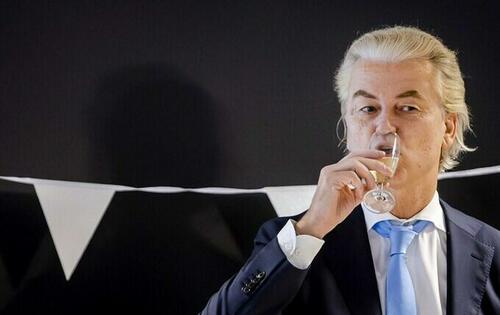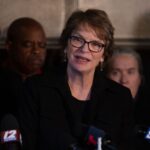
By Bas van Geffen, Senior Macro Strategist at Rabobank
In a big upset, the far-right PVV (Freedom Party) won the Dutch parliamentary elections. Moreover, Wilders’ party won by a much bigger margin than expected. Pollsters saw the biggest three parties running neck-and-neck ahead of election day, with each of them projected at about 27 seats. With 98% of the votes counted, the PVV looks to win 37 instead.
Other non-traditional parties have also done well. Newcomer NSC enters the political scene with 20 seats, and the Farmer-Citizens’ Movement (BBB) can put six additional seats next to its current one. The rise of these parties comes at the cost of the former coalition: liberal VVD (24 seats), centre-right CDA (5) and progressive D66 (9) collectively lost 35 seats. These shifts illustrate the Dutch’ discontent with traditional politicians, and the accountability of the government.
Internationally, Wilders has been known for his anti-Islam stance. This is still part of the party’s platform, but the PVV leader moderated his tone significantly during the campaign. Instead, he focused on those problems that are most pressing for a majority of the Dutch population. With his strict anti-migration Wilders promises a solution to the lack of (affordable) housing. Secondly, Wilders has been vocally opposed to all spending and legislation aimed at combatting climate change. His lead over the combined green and labour party (GL-PvdA) shows that concerns about the climate are, for many people, a luxury. One that they currently simply cannot afford, due to the cost of living crisis.
Though it was a landslide victory, PVV is well short of the 76 seats needed for a majority in parliament. Coalition talks were always going to be quite a puzzle given the fragmentation of the Dutch political landscape and Wilders’ victory certainly does not make this any easier. It would require big compromises on all sides. The coalition that will probably be explored first is one between PVV and the two more centre-right parties, VVD and NSC – possibly including BBB as well. But NSC has been very reluctant to entertain the idea of a coalition that includes the PVV. NSC’s campaign centred on good governance and their leader calls several of Wilders’ plans unconstitutional.
It's difficult to see many alternatives, though. If PVV cannot muster support from other parties, VVD, NSC and GL-PvdA could possibly form the basis of a coalition. That would also require big compromises. More importantly, bypassing the party that is by far the biggest winner of yesterday’s elections could only further fuel the population’s discontent with traditional politics.
Pending these coalition talks, it’s hard to predict the economic policies. But we see little odds that this will have a large impact on growth or the fiscal position of the country. The PVV wants to increase social spending, but the very tight labour market limits the odds that any government spending boosts growth significantly – especially if the government seeks to limit labour migration the same time. We do however see some upside risks to Dutch inflation, if a PVV-led coalition increases public spending.
PVV do not explicitly say how this spending should be financed, but the risk that this is done through large-scale borrowing is limited. Coalition partners like the VVD will probably seek to enforce budgetary discipline. Conversely, there seems to be little support for budget cuts though. However, Dutch public finances are already in a healthy position, with debt at only 50% of GDP. Indeed, yields on Dutch government bonds are relatively stable, despite the big election upset.
Overall, yields have been rising somewhat on the day, though. US data releases reminded investors of the fact that the Fed remains constrained by inflation that is still too high, even though the committee “was in a position to proceed carefully”, as this week’s release of the minutes showed. Gauges of US inflation expectations were revised higher, in an update to the University of Michigan’s consumer survey. And weekly initial jobless claims were significantly lower than expected.
By Bas van Geffen, Senior Macro Strategist at Rabobank
In a big upset, the far-right PVV (Freedom Party) won the Dutch parliamentary elections. Moreover, Wilders’ party won by a much bigger margin than expected. Pollsters saw the biggest three parties running neck-and-neck ahead of election day, with each of them projected at about 27 seats. With 98% of the votes counted, the PVV looks to win 37 instead.
Other non-traditional parties have also done well. Newcomer NSC enters the political scene with 20 seats, and the Farmer-Citizens’ Movement (BBB) can put six additional seats next to its current one. The rise of these parties comes at the cost of the former coalition: liberal VVD (24 seats), centre-right CDA (5) and progressive D66 (9) collectively lost 35 seats. These shifts illustrate the Dutch’ discontent with traditional politicians, and the accountability of the government.
Internationally, Wilders has been known for his anti-Islam stance. This is still part of the party’s platform, but the PVV leader moderated his tone significantly during the campaign. Instead, he focused on those problems that are most pressing for a majority of the Dutch population. With his strict anti-migration Wilders promises a solution to the lack of (affordable) housing. Secondly, Wilders has been vocally opposed to all spending and legislation aimed at combatting climate change. His lead over the combined green and labour party (GL-PvdA) shows that concerns about the climate are, for many people, a luxury. One that they currently simply cannot afford, due to the cost of living crisis.
Though it was a landslide victory, PVV is well short of the 76 seats needed for a majority in parliament. Coalition talks were always going to be quite a puzzle given the fragmentation of the Dutch political landscape and Wilders’ victory certainly does not make this any easier. It would require big compromises on all sides. The coalition that will probably be explored first is one between PVV and the two more centre-right parties, VVD and NSC – possibly including BBB as well. But NSC has been very reluctant to entertain the idea of a coalition that includes the PVV. NSC’s campaign centred on good governance and their leader calls several of Wilders’ plans unconstitutional.
It’s difficult to see many alternatives, though. If PVV cannot muster support from other parties, VVD, NSC and GL-PvdA could possibly form the basis of a coalition. That would also require big compromises. More importantly, bypassing the party that is by far the biggest winner of yesterday’s elections could only further fuel the population’s discontent with traditional politics.
Pending these coalition talks, it’s hard to predict the economic policies. But we see little odds that this will have a large impact on growth or the fiscal position of the country. The PVV wants to increase social spending, but the very tight labour market limits the odds that any government spending boosts growth significantly – especially if the government seeks to limit labour migration the same time. We do however see some upside risks to Dutch inflation, if a PVV-led coalition increases public spending.
PVV do not explicitly say how this spending should be financed, but the risk that this is done through large-scale borrowing is limited. Coalition partners like the VVD will probably seek to enforce budgetary discipline. Conversely, there seems to be little support for budget cuts though. However, Dutch public finances are already in a healthy position, with debt at only 50% of GDP. Indeed, yields on Dutch government bonds are relatively stable, despite the big election upset.
Overall, yields have been rising somewhat on the day, though. US data releases reminded investors of the fact that the Fed remains constrained by inflation that is still too high, even though the committee “was in a position to proceed carefully”, as this week’s release of the minutes showed. Gauges of US inflation expectations were revised higher, in an update to the University of Michigan’s consumer survey. And weekly initial jobless claims were significantly lower than expected.
Loading…






